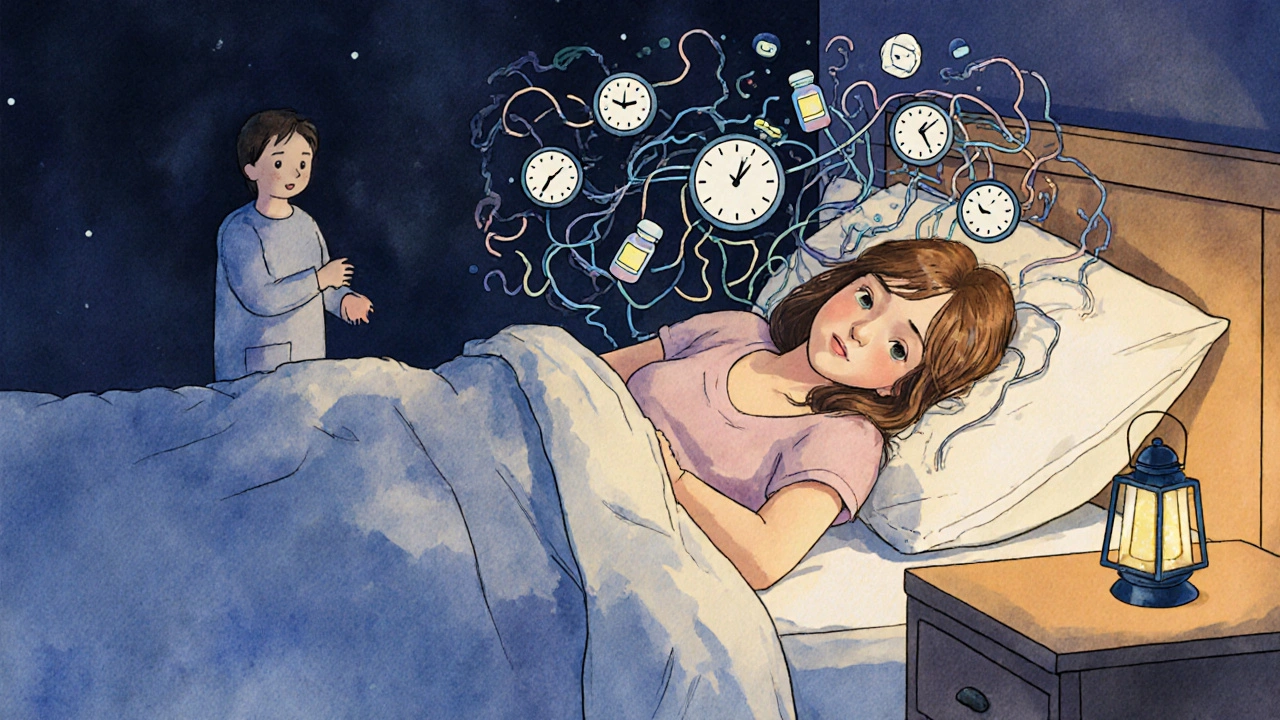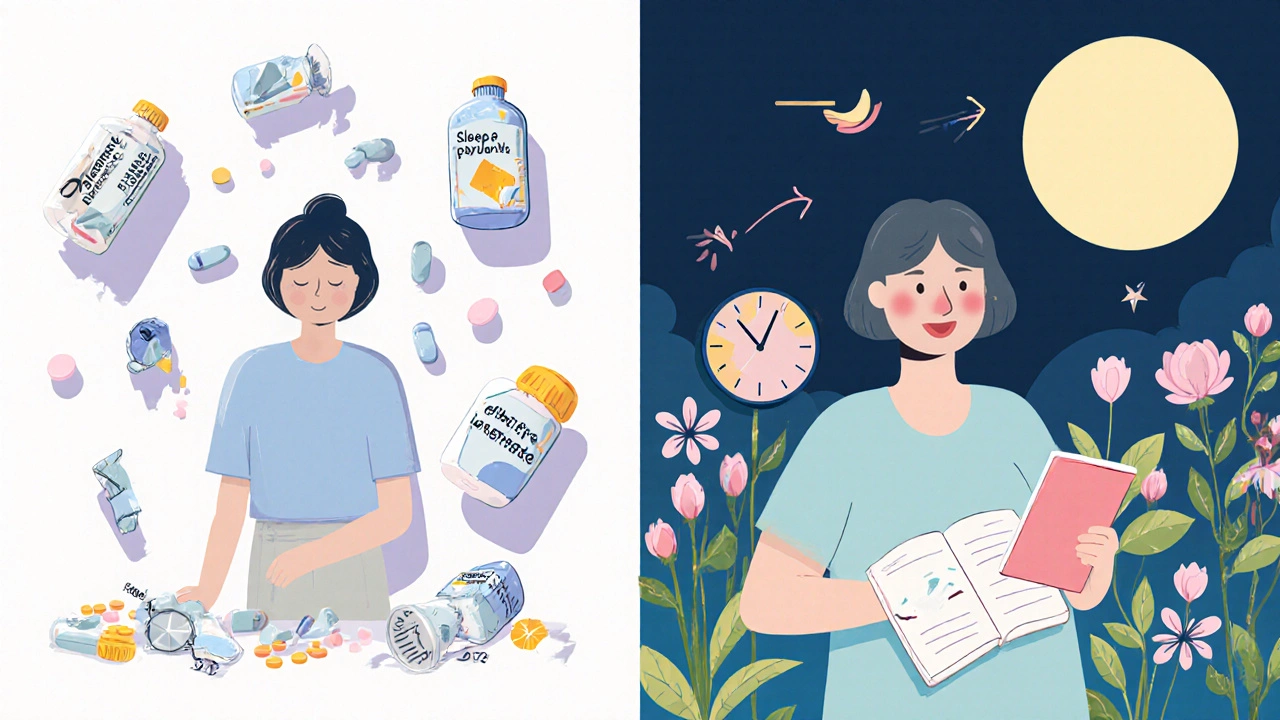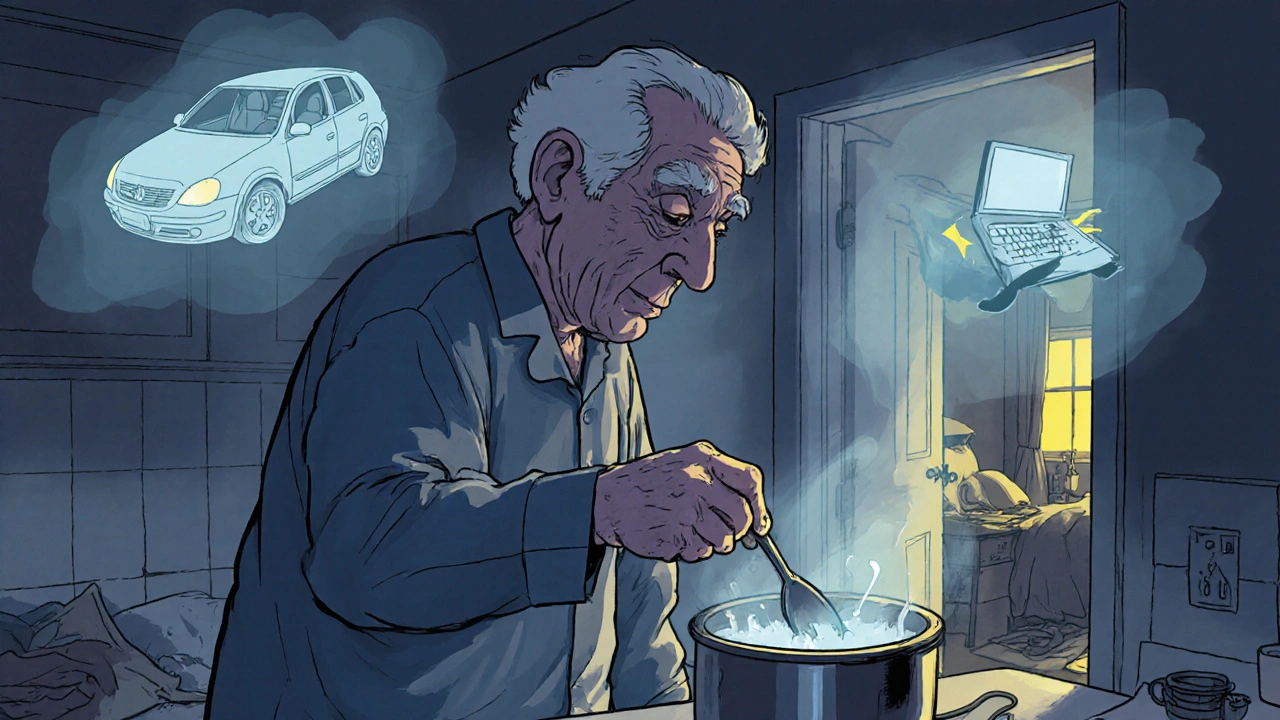More than 1 in 10 adults over 80 in the U.S. take prescription sleep meds every month. But for every person who finds relief, another wakes up confused, groggy, or worse-having no memory of driving home the night before. Sleep medications aren’t harmless quick fixes. They come with real risks: dependence, falls, memory loss, and even dangerous behaviors like sleepwalking or sleep-driving. And while they might help you fall asleep tonight, they rarely fix the real problem: your brain’s sleep cycle is out of sync.
How Sleep Medications Actually Work
Sleep meds don’t make you tired. They slow down your brain. Most target GABA, the brain’s main calming neurotransmitter. Benzodiazepines like lorazepam and diazepam have been around since the 1970s. They’re effective but come with a high risk of dependence-up to one-third of regular users develop tolerance within a few weeks. Then there are the Z-drugs: zolpidem (Ambien), eszopiclone (Lunesta), and zaleplon (Sonata). These were marketed as safer alternatives, but they’re not. They work on the same receptors, just more selectively. The FDA added a boxed warning to Ambien in 2019 after reports of people sleep-driving, making meals, or even having sex while asleep-with no memory of it later.
Some doctors prescribe antidepressants like trazodone or doxepin off-label for sleep. They’re cheaper-sometimes under $10 a month-but carry their own dangers. Trazodone can cause painful, prolonged erections. Doxepin, especially at higher doses, affects heart rhythm. Even over-the-counter options like diphenhydramine (Benadryl) or doxylamine (Unisom) aren’t safe for long-term use. A 2015 JAMA study found a 54% higher risk of dementia after just three years of regular use. These drugs block acetylcholine, a key brain chemical for memory and learning. What feels like a harmless nightcap could be quietly damaging your brain.
The Hidden Dangers: Dependence and Withdrawal
Most people don’t realize they’re dependent until they try to quit. You don’t need to be using them daily for weeks to develop tolerance. Some users report needing higher doses after only 10 days. When you stop, rebound insomnia hits hard. Your brain, used to being chemically suppressed, goes into overdrive. Sleep becomes impossible-not because your original problem returned, but because your nervous system is in withdrawal.
A 2021 JAMA study found that 40% of people trying to quit sleep meds needed medical help to taper safely. Cold turkey isn’t an option for most. A slow reduction-cutting 25% every two weeks-is the standard. But even then, nights can feel unbearable. One Reddit user, after six months of nightly Ambien, described three sleepless nights after stopping: “I felt like I was dying. I went back on it.” That’s not weakness. That’s neurochemistry.
And here’s the cruel twist: the very fear of not sleeping keeps people taking them. The anxiety around sleep becomes part of the addiction. It’s not just physical dependence-it’s psychological. You start believing you can’t survive without the pill. But the truth is, your body never lost its ability to sleep. It just got trained to rely on a shortcut.
Who’s Most at Risk?
Older adults are the fastest-growing group using sleep meds. In Canada and the U.S., 13% of people over 80 take them. But the American Geriatrics Society says these drugs should be avoided entirely in seniors. Why? They double the risk of falls. A fall at 75 isn’t like a fall at 35. It can mean a broken hip, months in rehab, loss of independence. The Beers Criteria, updated in 2023, lists all Z-drugs and benzodiazepines as potentially inappropriate for anyone over 65.
Women are also more likely to be prescribed these medications-50% more often than men. Why? Partly because women report insomnia more frequently, but also because doctors often default to prescribing rather than exploring root causes. Women metabolize zolpidem slower, which is why the FDA lowered the recommended starting dose for women to 5mg in 2019. Even that dose can leave you impaired the next morning.
And then there’s the workplace. A 2022 survey found 27% of users reported next-day drowsiness affecting job performance. That’s not just feeling tired. It’s slower reaction times, poor decision-making, memory lapses. One study found the cognitive impairment from a 10mg dose of Ambien was equivalent to a blood alcohol level of 0.05-0.08%-the legal limit for driving in most places.

What Works Better? The Science-Backed Alternative
There’s one treatment proven to work better than any pill: Cognitive Behavioral Therapy for Insomnia (CBT-I). It’s not a trendy app or a yoga class. It’s a structured, evidence-based program that reteaches your brain how to sleep. Studies show 70-80% of people who complete CBT-I see lasting improvement. Unlike pills, the benefits grow over time. You don’t need to keep doing it forever-you learn skills that stick.
CBT-I works by fixing the thoughts and habits that keep you awake. If you lie in bed worrying about sleep, your brain starts associating your bed with anxiety. CBT-I breaks that link. It teaches you to only go to bed when sleepy, get up if you can’t fall asleep after 20 minutes, and stop clock-watching. It includes stimulus control, sleep restriction (yes, you sleep less at first to build sleep drive), and relaxation training.
A 2021 study in JAMA Internal Medicine found that people using a digital CBT-I app called Somryst had a 60% remission rate after 12 weeks. That’s better than most sleep meds. And no grogginess. No risk of falling. No dependency.
But here’s the catch: CBT-I takes effort. You have to track your sleep. You have to stick to a schedule. You have to sit with discomfort. Most people give up after a week because it feels harder than popping a pill. But the payoff? Better sleep for years-not just nights.
What About Natural Options? Melatonin, Valerian, Magnesium
Melatonin gets a lot of attention. Amazon has over 50,000 reviews for it, with a 4.2-star average. People love it because it doesn’t make them groggy. But here’s the truth: melatonin isn’t a sleep pill. It’s a time signal. It tells your body it’s nighttime. If you’re jet-lagged or have a delayed sleep phase, it helps. If you’re stressed, anxious, or have chronic insomnia, it won’t fix it. Most OTC melatonin doses (3-10mg) are way higher than what your body naturally produces (0.3mg). Long-term effects? Still unclear.
Valerian root and magnesium are popular too. Some small studies show mild benefits, but nothing close to CBT-I. Magnesium might help if you’re deficient-common in older adults and people with diabetes-but taking extra won’t magically cure insomnia. These aren’t dangerous, but they’re not magic either. Don’t confuse them with solutions.

What’s New? The Future of Sleep Treatment
There’s real progress beyond pills and apps. In 2022, the FDA approved Quviviq (daridorexant), a new class of drug called an orexin receptor antagonist. Unlike GABA drugs, it doesn’t shut down your brain. It blocks the wake-promoting signal. Early data shows less next-day impairment than zolpidem. It’s promising-but still a drug. Still carries unknown long-term risks.
Meanwhile, healthcare systems are changing. In Canada and the U.S., 73% of major hospitals now require doctors to document a CBT-I referral before approving more than 30 days of sleep meds. That’s a big shift. It means insurers and providers are finally recognizing that pills aren’t the answer.
Research is also looking at genetic testing to predict who responds to which drug. Some people metabolize zolpidem slowly. Others don’t respond at all. In the future, a simple saliva test might tell you whether a sleep med is even worth trying.
What Should You Do?
If you’re on sleep meds right now, don’t stop cold turkey. Talk to your doctor. Ask about tapering. Ask about CBT-I. Most primary care providers don’t know how to deliver it, but they can refer you to a sleep specialist or a certified CBT-I therapist. Many programs are now available online through hospitals or insurance plans.
If you’re thinking about starting sleep meds, pause. Ask: Is this a short-term fix for a stressful week? Or am I planning to take this for months? If it’s the latter, CBT-I is the smarter choice. Even if it feels harder now, you’ll thank yourself in six months.
Sleep isn’t broken. Your habits, thoughts, and environment are. Medications mask the problem. CBT-I fixes it. And once you learn how to sleep naturally, you never have to rely on a pill again.
Can sleep medications cause dementia?
Yes, long-term use of certain sleep medications-especially over-the-counter antihistamines like diphenhydramine (Benadryl) and doxylamine (Unisom)-is linked to a 54% higher risk of dementia, according to a 2015 JAMA Internal Medicine study. These drugs block acetylcholine, a brain chemical critical for memory. Even prescription benzodiazepines and Z-drugs carry cognitive risks, particularly in older adults. The American Geriatrics Society advises avoiding them entirely in people over 65.
Is Ambien addictive?
Yes. While less addictive than benzodiazepines, Ambien (zolpidem) still carries a 5-10% risk of dependence after regular use. Many users report needing higher doses over time and experiencing withdrawal symptoms like rebound insomnia, anxiety, and tremors when stopping. The FDA issued a boxed warning in 2019 due to reports of sleepwalking, sleep-driving, and other complex behaviors. Women are especially at risk because they metabolize it slower.
What’s the safest sleep aid?
There’s no completely safe sleep aid, but the safest long-term option is none at all. For short-term use, low-dose melatonin (0.5-1mg) taken 1-2 hours before bed is low-risk and may help with circadian rhythm issues. But for chronic insomnia, Cognitive Behavioral Therapy for Insomnia (CBT-I) is the gold standard. It has no side effects, no dependence risk, and results that last years after treatment ends.
How long should you take sleep meds?
Clinical guidelines from the American Academy of Sleep Medicine recommend sleep medications for no more than 2-5 weeks. They’re meant for acute stress, jet lag, or temporary disruptions-not long-term management. After that, effectiveness drops, and risks rise. If you’re still relying on them after a month, it’s time to talk to your doctor about CBT-I or other non-drug approaches.
Can you quit sleep meds cold turkey?
No. Stopping abruptly can trigger severe rebound insomnia, anxiety, tremors, and even seizures in rare cases. The safest approach is a slow taper: reduce your dose by 25% every two weeks under medical supervision. Some people need even slower reductions or additional support. A 2021 JAMA study found 40% of users required professional help to discontinue safely.
Is CBT-I really better than pills?
Yes. Multiple studies show CBT-I improves sleep in 70-80% of people, with results lasting years. Sleep medications work for a few weeks, then lose effectiveness. CBT-I teaches skills that become permanent. A 2021 trial found a digital CBT-I app (Somryst) achieved 60% remission rates-better than most sleep drugs. And unlike pills, CBT-I has zero risk of dependence, falls, or cognitive decline.

katia dagenais
November 24, 2025 AT 15:31Okay but let’s be real-sleep meds are just the modern version of drinking your problems away. We’ve turned insomnia into a pharmaceutical product because we’re too busy scrolling to ask why we’re so wired in the first place. My grandma slept on a wooden bed with a wool blanket and woke up at 5am like a rooster. No pills. No apps. Just exhaustion from actual living. Now we’re medicating the symptom while ignoring the cause: our culture’s obsession with productivity over presence.
Josh Gonzales
November 25, 2025 AT 04:50CBT-I is the real deal. I did it through my health plan last year after 3 years of Ambien. First two weeks were brutal. Felt like my brain was rewiring itself with a hammer. But by week 6 I was sleeping 7 hours straight without a single pill. No grogginess. No fear of falling. Just quiet, deep sleep. If you’re on meds, talk to your doc about a referral. It’s not magic-it’s science.
Jack Riley
November 25, 2025 AT 23:54You say CBT-I fixes the problem but what if the problem is that the world doesn’t stop at 11pm? What if your brain is screaming because your job drains you, your partner ignores you, and your kid’s asthma wakes you up every night? You can’t therapy your way out of systemic exhaustion. Sleep meds are a Band-Aid on a gunshot wound-and sure, they’re dangerous-but so is pretending that individual behavior change can fix a society that glorifies burnout. I’m not lazy. I’m just tired of being told to fix myself when the system’s broken.
Jacqueline Aslet
November 26, 2025 AT 00:22It is, indeed, a matter of profound concern that pharmacological intervention has become the default modality for addressing a fundamentally physiological and psychological phenomenon. The normalization of hypnotic agents in geriatric populations represents not merely a clinical failure, but an epistemological one: we have outsourced the regulation of our most primal biological rhythms to chemical substitutes, thereby eroding our innate capacity for self-regulation. One must question whether the pursuit of convenience has supplanted the cultivation of wisdom.
Caroline Marchetta
November 26, 2025 AT 13:11Oh sweet mercy, another post about CBT-I like it’s some kind of yoga retreat for insomniacs. Meanwhile, I’m 72, widowed, living on a fixed income, and my doctor handed me a script for Lunesta like it was a free sample of candy. You think I want to sit in a dark room counting breaths while my hip screams? No. I want to sleep. Not ‘retrain my brain.’ Not ‘build sleep drive.’ Just… sleep. And if a little pill gives me that? Fine. I’ll take the dementia. At least I won’t be awake to see it coming.
Valérie Siébert
November 27, 2025 AT 21:46CBT-I is the only thing that actually WORKED for me. I tried melatonin, valerian, magnesium, even that weird weighted blanket. Nothing. Then I did the 6-week digital program through my insurance. It was HARD. Like, ‘I wanna cry and eat ice cream at 3am’ hard. But I stuck with it. Now I sleep like a baby. No pills. No guilt. Just peace. If you’re thinking about it-just start. Even 10 mins a day. You got this 💪
Kimberley Chronicle
November 29, 2025 AT 20:29Just wanted to add that in the UK, NHS is slowly rolling out CBT-I via digital platforms-no waiting lists, free, and evidence-based. It’s not perfect, but it’s a start. The real win? When doctors stop seeing sleep as a ‘problem to fix’ and start seeing it as a ‘system to support.’ We need more of that mindset. Also-melatonin at 0.5mg, not 10mg. Seriously. You’re not lighting a firework.
fiona collins
December 1, 2025 AT 08:14